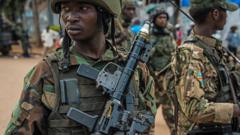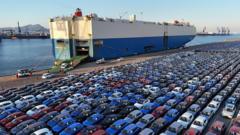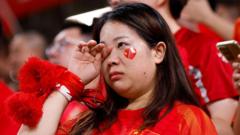As Rwanda-backed rebels escalate tensions, China must navigate its business interests while addressing regional instability.
**China's Diplomatic Balancing Act Amid DR Congo Conflict**

**China's Diplomatic Balancing Act Amid DR Congo Conflict**
China's neutrality faces scrutiny as it adapts to the evolving conflict in eastern DR Congo.
Despite a longstanding policy of non-interference, China has recently shifted its diplomatic stance regarding the conflict in the eastern Democratic Republic of Congo (DRC). The fighting has intensified as Rwandan-backed M23 rebels have overtaken key cities, prompting China to potentially redefine its diplomatic balancing act. Historically, China has steered clear of taking sides in African conflicts, prioritizing its expansive business dealings across the continent. This careful neutrality was evident in its sparse commentary on political turmoil in regions like West Africa's Sahel.
However, the unfolding crisis in eastern DRC has pressed China to reconsider this approach as it grapples with its significant mineral interests in the region. M23 rebels, claiming to protect the rights of the Tutsi minority, have accused the Congolese government of violating peace agreements, thus reigniting tensions that had simmered for years. Previously, China limited its remarks to vague suggestions of foreign interference in support of the M23. Yet, following significant victories by the rebels in securing Goma and Bukavu, China directly called for Rwanda to cease its support for the group.
Still, experts point out that while China's language has shifted towards direct criticism of Rwanda, it remains measured, emphasizing hoped-for actions rather than outright condemnation. The country’s UN representative has echoed calls for Rwanda's military withdrawal from DRC territory without preconditions, reflecting a delicate diplomatic stance that seeks to maintain its ties with both nations.
This nuanced position from China can be viewed as a response to increasing international scrutiny brought to light by UN expert analyses, indicating substantial evidence of Rwandan military backing for the M23. This represents a critical juncture where China’s continued economic dependency on DRC’s abundant mineral resources, including coltan and cobalt—crucial for electronic devices and lithium batteries—may compel a push for peace.
While the conflict poses risks to Chinese business operations in the DRC, the extent of this impact remains to be fully assessed. Notably, Chinese investments in local infrastructure, telecommunications, and power projects have not yet been significantly disrupted. However, with ongoing violence concentrated in the DRC's mineral-rich provinces, the stability of future operations remains uncertain.
Additionally, China's military support for both Rwanda and DRC complicates the situation further, with substantial arms dealings allowing both nations access to Chinese military technology. This concurrent support has raised questions surrounding the usage of Chinese weaponry by the rebel faction, although direct links have yet to be established.
Despite potential strains, China’s diplomatic relations with both countries appear intact. Rwanda asserts that ties remain strong, while engagements between Chinese diplomats and Congolese officials indicate ongoing dialogue and investment interest. Both nations are key players in China’s ambitious Belt and Road Initiative, illustrating the deep economic ties that may ultimately drive China towards a swift resolution of the current conflict in the DRC. As both countries rely heavily on Chinese investment and infrastructure projects, the need for stability is essential for the continuation of mutual development interests.
This unfolding narrative not only reveals China's evolving foreign policy but also highlights the intricate interplay between international relations and the geopolitics of resource-rich regions in Africa.
However, the unfolding crisis in eastern DRC has pressed China to reconsider this approach as it grapples with its significant mineral interests in the region. M23 rebels, claiming to protect the rights of the Tutsi minority, have accused the Congolese government of violating peace agreements, thus reigniting tensions that had simmered for years. Previously, China limited its remarks to vague suggestions of foreign interference in support of the M23. Yet, following significant victories by the rebels in securing Goma and Bukavu, China directly called for Rwanda to cease its support for the group.
Still, experts point out that while China's language has shifted towards direct criticism of Rwanda, it remains measured, emphasizing hoped-for actions rather than outright condemnation. The country’s UN representative has echoed calls for Rwanda's military withdrawal from DRC territory without preconditions, reflecting a delicate diplomatic stance that seeks to maintain its ties with both nations.
This nuanced position from China can be viewed as a response to increasing international scrutiny brought to light by UN expert analyses, indicating substantial evidence of Rwandan military backing for the M23. This represents a critical juncture where China’s continued economic dependency on DRC’s abundant mineral resources, including coltan and cobalt—crucial for electronic devices and lithium batteries—may compel a push for peace.
While the conflict poses risks to Chinese business operations in the DRC, the extent of this impact remains to be fully assessed. Notably, Chinese investments in local infrastructure, telecommunications, and power projects have not yet been significantly disrupted. However, with ongoing violence concentrated in the DRC's mineral-rich provinces, the stability of future operations remains uncertain.
Additionally, China's military support for both Rwanda and DRC complicates the situation further, with substantial arms dealings allowing both nations access to Chinese military technology. This concurrent support has raised questions surrounding the usage of Chinese weaponry by the rebel faction, although direct links have yet to be established.
Despite potential strains, China’s diplomatic relations with both countries appear intact. Rwanda asserts that ties remain strong, while engagements between Chinese diplomats and Congolese officials indicate ongoing dialogue and investment interest. Both nations are key players in China’s ambitious Belt and Road Initiative, illustrating the deep economic ties that may ultimately drive China towards a swift resolution of the current conflict in the DRC. As both countries rely heavily on Chinese investment and infrastructure projects, the need for stability is essential for the continuation of mutual development interests.
This unfolding narrative not only reveals China's evolving foreign policy but also highlights the intricate interplay between international relations and the geopolitics of resource-rich regions in Africa.





















